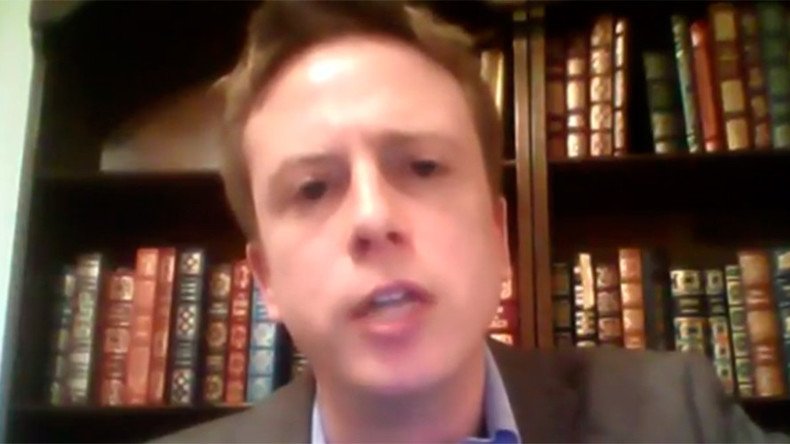Exclusive: US journalist may seek asylum overseas after being re-imprisoned for talking to press

Barrett Brown’s first stint in federal prison outraged free speech advocates, but he says his new re-incarceration, simply for appearing in the media, is the “last straw.” The US journalist tells RT he wants out of the “moral vacuum” America has become.
Brown spent four years behind bars after an FBI raid and subsequent grand jury indictment in 2012, stemming from his alleged ties to hackers and his republishing a link to leaked emails of Stratfor, a private global intelligence company. In late 2016, Brown was released but remained under home confinement within the jurisdiction of the US Bureau of Prisons (BOP).
Last week, on April 27, following an interview with Vice News and before a scheduled appearance on NPR, Brown was arrested again. He was back behind bars for four days at the Federal Correctional Institution in Seagoville, Texas.
“The BOP decided all of a sudden that I'm not allowed to do press interviews,” Brown told RT America’s Anya Parampil on Thursday in an exclusive interview.
Brown claims he was “required to force any journalist to fill out a form” to be submitted to a BOP representative. That policy, however, was not in line with a BOP program statement on news media contacts, Brown says. Nevertheless, he was purportedly threatened with a refusing order infraction.
READ MORE: Barrett Brown's email suspended ‘for using it for the wrong thing’
During his four-year sentence, when he wasn’t in “the hole,” or solitary confinement, Brown spent his time imprisoned reading news magazines such as The Economist or raw sources. The time away from nonstop punditry and social media fluff was good overall, despite some drawbacks, he told RT.
Brown may not have kept abreast of every newsflash, but one big story he experienced firsthand was the shared plight of roughly 2 million US inmates.
“None of them have due process rights effectively,” he said, “because to sue your captors, even if there's ongoing issues, you have to go through this long process called the administrative remedy process, which was instituted by Congress about 20 years ago, in which your captors get to oversee.”
“So, you get to sue your captors if your captors let you, essentially. It says a lot about this nation at this point in time,” he added.
Brown lamented the US’s current state of affairs, not just politically, but socially. He cited the downfall of whistleblowers in recent years, and looked more favorably on developments in Germany and Iceland, where protests and uprisings had shifted government actions or rolled back the state altogether. Those countries were the kind he would “like to live in,” he told RT.
“I have no problem going to prison if it helps to bring light to certain issues, if people take that ball and run with it,” Brown said. “But given just the lack of press coverage of my arrest, of the BOP's actions and the state's actions, I've decided finally that when I'm off probation, when my legal obligations are over, I'll be leaving the United States, seeking, if necessary, political asylum, revoking my citizenship, perhaps moving to either Iceland or Germany.”
“I will no longer stay here in this moral vacuum,” he added. “You can only take so much.”
READ MORE: Assange: US prosecuting Barrett Brown for quoting assassination threats against me
Brown was also asked to talk about his latest book, sardonically titled “Keep Rootin’ For Putin: Establishment Pundits and the Twilight of American Competence.”
Taking on five mainstream media columnists, including Thomas Friedman of the New York Times, Brown called the book’s targets “emblematic of the incompetence that has managed to run free.”
Friedman was “wrong on China, wrong on Russia,” Brown said, pointing to the columnist’s incorrect predictions that China would not censor the internet or that Russian President Vladimir Putin would turn out to be a “great reformer and democratic hero, and I think that's not entirely correct.”
Contempt for the press fueled Brown’s activism early on, he told RT.
“These are people who can get things wrong every single day,” Brown said. “They are the eyes and ears of our establishment in many ways, and they're failures.”













